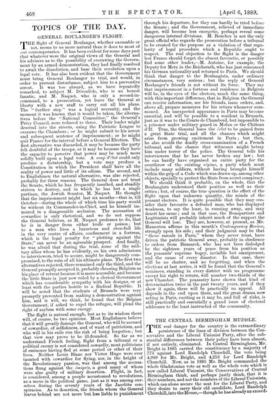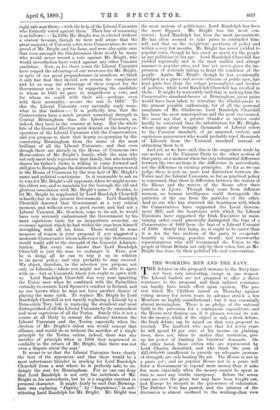THE CENTRAL BIRMINGHAM MUDDLE. ingly safe seat there,—with the help
of the Liberal Unionists who formerly voted against them. Their line of reasoning is as follows :—` In 1886, Mr. Bright was re-elected without a contest because, though we were well aware that the great majority of Unionist votes were Conservative, we were proud of Mr. Bright and his fame, and were also quite sure that even amongst the Gladstonians there would be many who would never record a vote against Mr. Bright, who would nevertheless have voted against any other Unionist candidate. Now, as for three years the Liberal Unionists have reaped the advantage of our reverence for Mr. Bright, in spite of our great preponderance in numbers, we think it only fair that they should now return the compliment and let us reap the advantage of their respect for the Government now in power, by supporting the candidate to whom in 1885 we gave so magnificent a vote, and for whom we could with their aid,—perhaps even with their neutrality,—secure the seat in 1889.' To this the Liberal Unionists very naturally reply some- what in this fashion It is perfectly true that the Conservatives have a much greater numerical strength in Central Birmingham than the Liberal Unionists, as, indeed, they have in the country at large. But the whole fate of the General Election must depend on the hearty co- operation of the Liberal Unionists with the Conservatives, and you propose to show that hearty co-operation by dis- connecting Birmingham from the name of the most brilliant of all the Liberal Unionists ; and that even though there are already in the House of Commons two Home-rulers of Mr. Bright's family, while the man who not only most truly represents that family, but who heartily shares his father's views, is willing to come forward and still give to Birmingham the distinction of being represented in the House of Commons by the true heir of Mr. Bright's name and political convictions. Is it reasonable to ask us to vote for Mr. Bright's old opponent, when we might secure his eldest son, and so maintain for the borough the old and glorious association with Mr. Bright's name ? Besides, to let Mr. Bright be supplanted by Lord Randolph Churchill is hardly fair to the present Government. Lord Randolph Churchill deserted that Government at a very critical moment, and without even a good excuse, and had not a Liberal Unionist, Mr. Goschen, come to its aid, he would have very seriously embarrassed the Government by his most capricious taste for an inopportune economy, an economy against which he had within the year been himself inveighing with all his force. There would be some measure of reason in your proposal if you suggested a moderate Conservative whose adherence to the Government would really add to the strength of the Unionist Adminis- tration. But every one knows that Lord Randolph Churchill is just the man to endanger it. Even now he is doing all he can to trip it up in relation to its naval policy, and very probably he may succeed. We object, therefore, to the selection you propose, not only as Liberals,—where you might not be able to agree with us,—but as Unionists, where you ought to agree with us. Lord Randolph Churchill was very near upsetting the Union once when he combined with the Parnellites virtually to censure Lord Spencer's conduct in Ireland, and no one knows when he may not have another chance of playing the same trick. To replace Mr. Bright by Lord Randolph Churchill is not merely replacing a Liberal by a Democratic Tory, but is replacing the steadiest and most distinguished of all the Liberal Unionists by the unsteadiest and most capricious of all the Tories. Surely this is not a course at all likely to cement the alliance between the Liberal Unionists and the Tories, especially when the election of Mr. Bright's eldest son would cement that alliance, and would do so without the sacrifice of a single principle by the Tories, unless, indeed, there was any sacrifice of principle when in 1886 they acquiesced so cordially in the return of Mr. Bright, that there was not even a dispute about the seat.'
It seems to us that the Liberal Unionists have clearly the best of the argument, and that there would be a most unfortunate blunder in sending for Lord Randolph Churchill from a seat where he is perfectly safe, to en- danger the seat for Birmingham. For no one can deny that Lord Randolph is not only the antithesis of Mr. Bright in his antecedents, but he is a singular contrast in personal character. It might fairly be said that Binning- ham was replacing " Dignity " by " Impudence," in sub- stituting Lord Randolph for Mr. Bright. Mr. Bright was the most serious of politicians ; Lord Randolph has been the most flippant. Mr. Bright was the most con- sistent; Lord Randolph has been the most inconsistent. He has often seemed to take pains to contradict him- self, and that on the weightiest questions of policy and within a very few months. Mr. Bright has never yielded to popular cries, though he has cared as much for the people as any politician of his age. Lord Randolph Churchill has yielded repeatedly and in the most sudden and abrupt manner to popular cries, and has yet never given the im- pression of seriously taking to heart the condition of the people. Again, Mr. Bright, though he has occasionally indulged in a grave and severe criticism of public men, has kept quite free from the vulgar personalities and levities of politics ; while Lord Randolph Churchill has revelled in them. It might be reasonably said that in making him the Conservative standard-bearer at Birmingham, great pains would have been taken to stimulate the Gladstonians to the utmost possible enthusiasm, for of all the personal assailants of Mr. Gladstone, Lord Randolph Churchill, has been the most unscrupulous and the most envenomed. We must say that a greater blunder in tactics could hardly be conceived than the substitution for Mr. Bright, whose name alone brought thousands of Liberal voters to the Unionist standard, of an unsound, violent, and capricious manceuvrer who would probably repel thousands of Liberals from the Unionist standard instead of attracting them to it.
And yet, as we have said, this is the suggestion made by one section of the Unionist Party to the other section of that party, at a moment when the only substantial difference between the two sections is the difference in antecedents, not the difference in existing principles. So far as we can judge, there is now no more real distinction between the Tories and the Liberal Unionists, so far as practical policy is concerned, that there is difference between the waters of the Rhone and the waters of the Saone after their junction at Lyons. Though they come from different sources, no human intelligence could distinguish the particles of the one from the particles of the other.. And no one who has observed the heartiness with which the Conservatives have supported the Local Govern- ment Bill, and the heartiness with which the Liberal Unionists have supported the Irish Executive in main- taining order, could practically distinguish the bias of a Conservative of 1889 from the bias of a Liberal Unionist of 1889. Surely this being so, it ought to be easier than. it is for the two sections of the party to co-operate heartily in choosing popular, steady, and trustworthy representatives who will recommend the Union to the people of Great Britain not only by their votes, but, as Mr. Bright has done, by their political life and conversation.



































 Previous page
Previous page